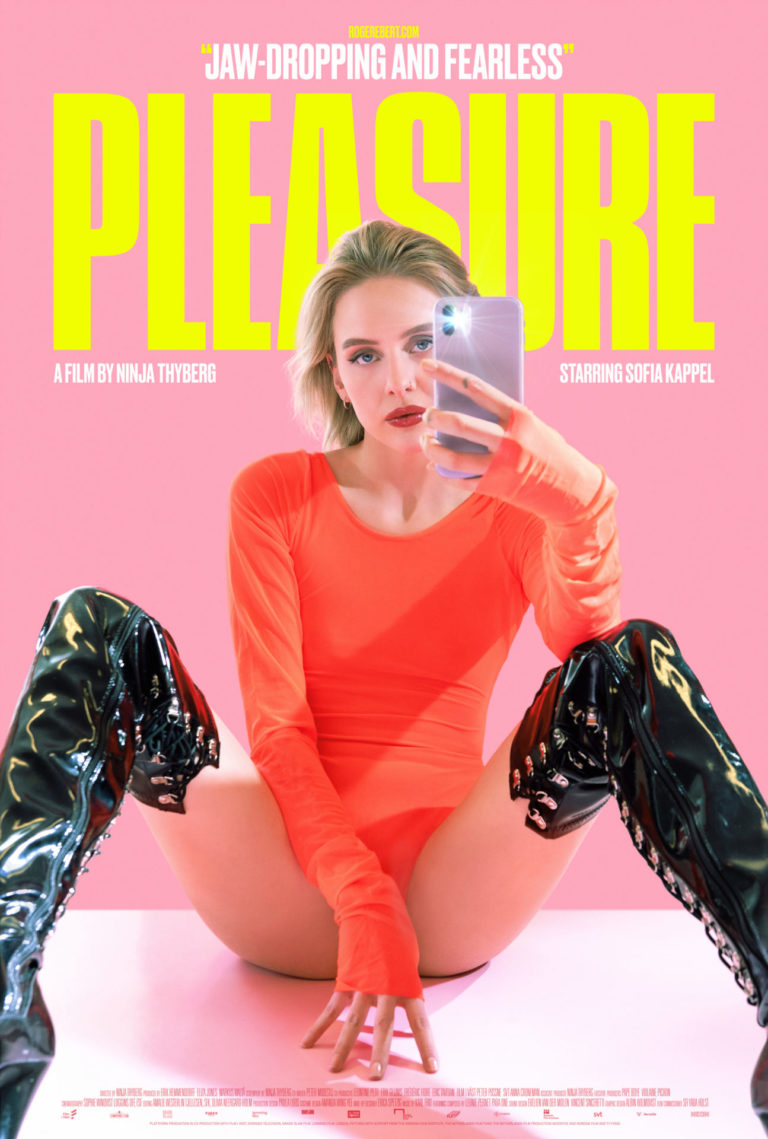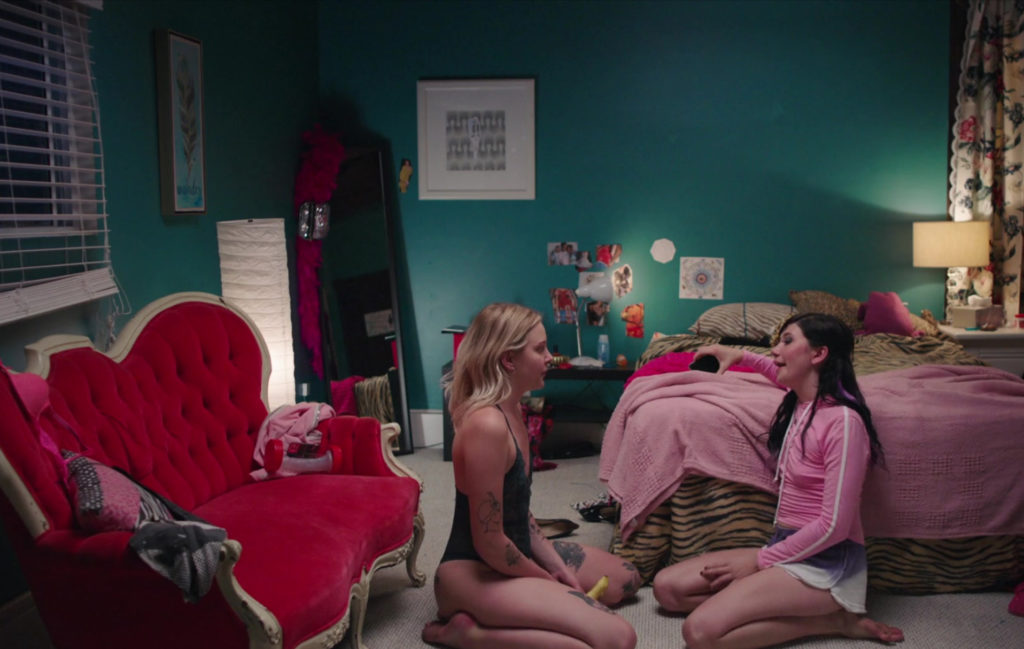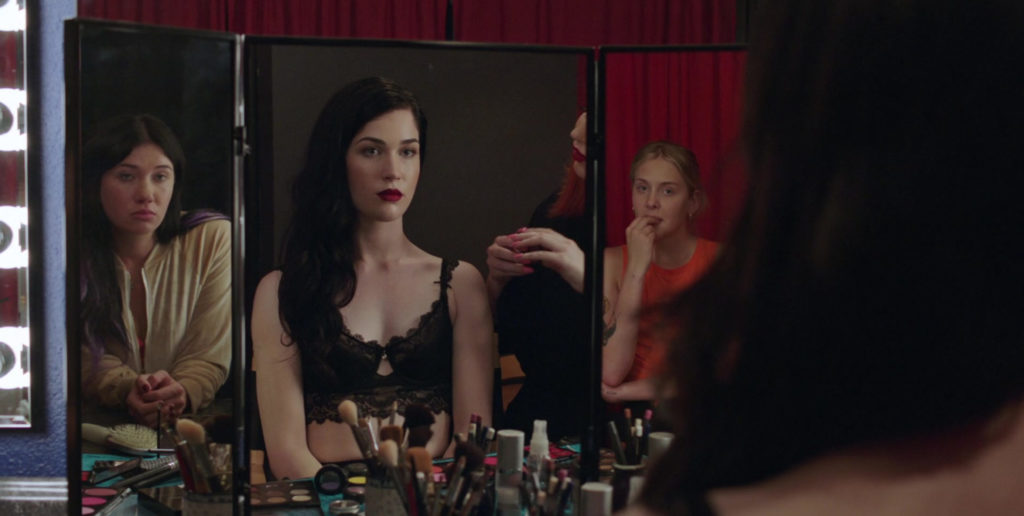
Synopsis : Bella Cherry arrives in Los Angeles with dreams of becoming an adult film star, but she soon learns that fame won’t come easy as she harnesses her ambition and cunning to rise to the top of this mesmerizing and singular world.

Writer/Director Ninja Thyberg and Actress Sofia Kappel
Q: You were an anti-porn activist as a teenager. What was the journey like from that point to what we saw on the screen?
NT: When I was 16, I had my first boyfriend. Then I became an anti-porn activist for a few years and became really engaged in the subject. But after awhile, I started to question the effect, so I just was focusing on that. I felt there was a lack of positive image of female sexuality, and so I wanted to become interested in feminist pornography.
That’s actually why I became a filmmaker in the first place. I decided I was going to make feminist porn. So I was part of a feminist porn community for awhile. Then I also started to question [doing that]. Some of the women in mainstream porn don’t agree with them being seen as victims. So I started to question that, and was digging into that.
I studied Gender Studies and wrote an essay about porn while going to film school. I also started to challenge myself again. I made the short film, “Pleasure,” but I hadn’t actually met anyone from the porn industry because we don’t have a porn industry in Sweden. So when it got into Cannes and Sundance, I felt I needed to make a longer version and this time I have to make it to show what I witnessed and when I became part of that community. It was a 20-year process.
Q: “Pleasure” short film is on Amazon. But can you talk about the audition when you cast Sofia [Kappel]. You were searching for a long time and saw 2,000 actresses for a year and a half — it was not working out. And then Sofia came in the room.
NT: For a year and a half, I knew that she was out there somewhere, and I knew that she was going to have to carry the whole film. So I was like, “I’m not going to give up until I know that there she is.” Everyone around us kept saying after awhile, “You’re just chasing a ghost, because you’ve invented someone that you don’t have and that doesn’t yet exist. That’s why no one is good enough. Seriously, after hundreds of young talented actresses— it can’t be that none of them are good enough.”
Then one day, I opened the door and there she was. I remember it like a slow-motion moment. She was standing there in fake leopard fur and smoking a cigarette, “Hi!.” I was immediately felt, “Wow, what if she can’t act?” I knew that she hadn’t acted before. She was a total amateur and had never been to an audition or anything.
Q: Yet Sofia won what was basically the Swedish Academy Award for this, her first movie, at age 20. This was a very, very brave thing to do coming out of the gate. So Ninja, talk about her building this character with a feeling for the nuances of living in this world. And Sofia, what did you bring to Bella Cherry, that was from you. How did you two build this character?
NT: I knew that I needed to build her up like she was a real person. So we spent nine months from when Sofia got the part to when we started shooting. We developed the character together and I changed a lot of the script. We realized awhile ago that Bella was our child: it’s half you and half me, because there’s a lot of me in her as well.
Because I really wanted it to be a story from a 19-year-old girl’s perspective, I always felt, that I was [not crucial] anymore. It felt so crucial to have Sofia onboard. She’s not just being an actress in front of the camera. It’s really a collaboration — I asked her so many questions.
SK: It was like, Bella, no she wouldn’t do that, but she would do this. I was getting to know her so I also trusted Ninja.
NT: I am not as good a writer as the dialogue that is there — so it’s maybe 50/50 [with me and Sofia]. A lot of it was because of the chemistry that we had with Revika Anne Reustle, the actress who plays Joy. Also, sometime it was just the way they [created] the many punch lines.
SK: And the way we delivered them…
NT: Yeah, that’s something that’s in the moment. Which makes me look much better than I am, so thank you for that.

Q: The film feels so raw and nuanced because of that.
NT: But especially here, compared to everywhere else, [there’s a] double standard. I feel like some social peer than anywhere else. I mean I haven’t been everywhere, but especially if you compare it to Europe. I hope you’re right, that it’s going to just make it fun.
Q: Were there other films that were an influence specifically, or that came before you, like “Oh, wow, that’s not” or “that’s not the gaze that I want for this film”?
NT: Yeah. I would say basically, all films ever. No, but I’m confident not to say that this has never been done before, like you won’t find the industry from a general perspective, like the contemporary. I remember I saw the film “Short Bus” when I was really young, and it was the first time I got to see sex, explicit sex, in a movie theater. That really influenced me. I remember it as a fantastic film.
Also, there’s a Swedish director, Lukas Moodysson, whose “Lilya 4-Ever” is about a young woman who’s being trafficked and forced into prostitution. There’s this scene where she goes to a place where there’s all these guys basically raping her. While all these men are having sex with her, the whole scene is shot through from her [point of] view. All of these men come towards the camera, like having sex with the audience. You feel like they are all having sex with you.
When I saw that, it completely blew my mind because I realized, “Okay, I’ve never seen this before.” Every sex scene, every rape scene is filmed from the male perspective, looking at the woman as an object. We never see it [the other way.] It wasn’t until you see the other perspective that you understand that your whole life, you’ve been looking at the world from one angle.
That was something that I was really very inspired by. For example, in one scene [in our film], from the moment they start to have sex, we only see it from her perspective.
Q: I love a lot of scenes in the film, especially the scene with Aiden Starr, who’s the female director, because it’s all about consent. It seems radical that she cares about the female orgasm in porn. And she’s actually a real performer. For both of you, talk about developing that scene. I feel like in a way it’s a crucial part of the movie.
NT: Everyone in the film, except Bella, are played by actual people from the adult industry. Some of them play themselves, like Aiden Starr and Mark Spiegler. It’s important to say that some of them are definitely not play themselves. The really bad guys in the film are played by really good guys in real life.
I’ve known Aiden Starr for a very long time, and I’ve lit many of her porn sets. That place where we shot that, we were doing almost that exact same film with the same crew and everything, and I know how she works. So we decided we’re going to just do it, as if it would be for real.
The only difference is they’re not having sex for real, and we’re cutting in and making sure she’s okay. We filmed for maybe four hours. They just did what they would normally do and we were filming everything.
SK: I was really looked forward to it. But thought it was so – I’m really impressed by people that do that often because… In one sense it’s weird, but it was amazing and it was really nice to do that with Aiden. The response from the entire crew, I felt taken care of.
You were trying to find angles and a new shot. You would come and hold my head up or lift my body so that it didn’t hurt. It was an amazing scene to shoot, and I had a lot of fun. It was amazing.

Q: The scene that comes right after that is not that scene, it’s violent and very intense. Personally, it was hard to watch. But I felt it was in the movie for a reason.
NT: Yeah, it’s important. I have a rule to not show rapes in movies because I think we’ve seen too many of them. I’m damaged for life, knowing since I was nine that my body is rape-able, and being afraid of being raped so much before I even started to think that I wanted to have sex.
But I felt with this, I wanted to have that scene in the film [because] it felt important. For example, when they actually do have sex, we don’t ever see her body — we only see the man. And when they’re violent to her before that, she’s fully dressed and mostly we look into her face.
I had mixed feelings. I’ve noticed that for some people, it’s overshadowing the rest of the film. There’s been too much focus on that scene in conversations afterwards. Also because Sofia is such an incredible actress. You [to Kappel] make it look so real that everyone thinks that it’s almost happening for real.
SK: It was the best day on set for me.
NT: It didn’t happen for real, she’s acting, and we rehearsed everything, and there’s the camera and we’re cutting in between takes, and we’re taking the camera around. I think because the film is about manipulation. I don’t know if I have a good answer. It’s important but I also think it’s problematic.
Q: Sofia, how did you feel with your costar, the girl, in filming that scene?
SK: The strap-on scene? I did not want a dick, not at all. That was one of the hardest scenes for me to do because I think with the abusive scene when Bella is the one being put through it, I can relate to that. I think most women can do that, too, because one out of three women have, in their life, been sexually abuse.
I’ve never abused anyone else, so it really sucked getting into that head space and becoming Bella’s own abuser. It was really difficult, but I’m really glad that I had that scene with Evelyn [Claire]. Before we shot that scene, me and Evelyn had a discussion about what was okay and what was not okay. I was too uncomfortable to hit her, so I’m actually fighting Ninja in the bed, so I’m not actually hurting her. But it was really uncomfortable in this movie for me.
NT: Yeah. It was also really hard for me, because that was one of those moments where we had planned to shoot it, to do it much worse. You knew why it was important, and [to Sofia] it wasn’t like you didn’t think you wanted to do it, but I could tell that you were afraid to have to push someone to do something against their will, in a way. Or not against your will, but against your comfort zone. So we managed to work around and rethink and find new angles.
Yeah, but I think I did not at all expect — you think other things are going to be hard. But I think it’s the same thing as what is happening to her, when once you put yourself in that other perspective, treating a woman like that. I think it takes you to another level of really understanding misogynistic behavior, and also what you’ve been through yourself.
Q: Ninja, how did you get this film funded?
NT: Just regular government funding from the Swedish Film Institute. It wasn’t a problem. It’s very different from here. But they said, “Oh, it’s important for female directors to get their story out, and we trust you of course to make your art. So here, take this tax money.”

Q: Sofia, you really became your character throughout this movie, there are clearly many emotional scenes where Bella has to stop her work, push herself to finish her work.
SK: When Ninja called me and told me I got the part, I immediately said yes, and then it was like “No, you’re not allowed to say yes now. You have to take at least a week to think about it.” Obviously, that was a ringing “yes” [in my mind] nonetheless.
But I truly believed in Ninja’s vision. As a female, it felt was important to me as well. I think depending on who is watching the movie, even between me and Ninja, the film is going to mean different things. To me, it’s a lot about being female and taking the power away from the men, who are objectifying us, and doing it ourselves.
Also showing a body… I never realized I have body dysmorphic disorder, and I’ve been really sick with that. So it was a lot to me, pushing myself. If I would have listened to what I call my “brain monsters,” I would never have shown up to audition. It’s really important to push myself, because we’re capable of doing so much more than we think, and doing this movie completely changed my life in the most positive way possible.
Of course, sometimes it was really hard and I doubted myself. Ninja was with me, and the entire crew, everyone was so supportive. I was never put in a situation where I felt so uncomfortable that I didn’t want to do it and when I didn’t want to do it, I didn’t do it. For example, the vagina in the beginning — it’s not mine because I refused. I think it was really important that Ninja never, ever crossed my lines, which helped me be very trusting towards her. She proved to be very, very reliable and I could trust her with my life. And I do.
NT: It’s my vagina.
Q: Ninja, how do you feel when audiences laugh at scenes you didn’t intend to be amusing?
NT: Actually, for me, I see this film as a comedy. I had so much fun while shooting it. I was laughing so much. Of course there are heavy parts, but I think it’s hilarious. I understand that a lot of people see it with very serious eyes. I do, too.
It’s very rare, but I understand the question. Sometimes it’s saying something about the people laughing. I can’t think of anywhere in this film where I felt frustrated that people were laughing at the wrong time. I have experienced it in other films, and of course it makes you sad that I don’t really — it doesn’t matter that it’s my film like that, it’s anywhere. Also, I really wanted this film to be — I worked so much with it and I tried to add so many different layers.
One of my biggest admissions is that I wanted to build a platform where you can find different types of discussions. People really see totally different films and that’s customary — two people coming out of the theater having completely opposite ideas of what the film is about, what it said and what my intentions were. I think good art is supposed to be like that.
Check out more of Nobuhiro’s articles.
Here’s the trailer of the film.

